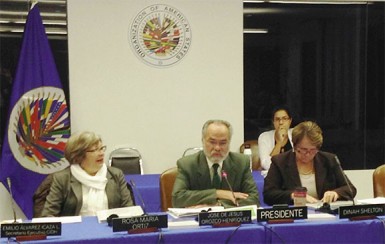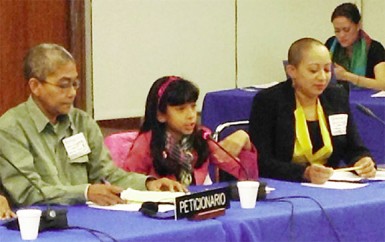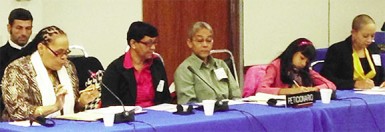The Inter-American Com-mission on Human Rights (IACHR) has expressed concern that Guyana is relying on the popular vote to protect human rights and has urged the government to take a leadership role.
This is according to reports on an IACHR public hearing on violence and discrimination against children in Guyana, which was held in Washington, DC on Monday.
The IACHR, which is an organ of the Organisation of American States (OAS), is concerned with the promotion and the defence of human rights in the Americas.
Human Services Minister Jennifer Webster represented Guyana at the hearing on “Violence, Sexuality and Gender Issues Affecting Children in Guyana,” during the 149th Period of Sessions, where four Guyanese civil society organisations, Red Thread, Artistes In Direct Support (AIDS), Family Awareness Conscious Together (FACT) and Society Against Sexual Orientation Discrimination (SASOD) highlighted concerns.

They said the hearing examined three areas of concern affecting children in Guyana: corporal punishment in schools; discrimination against children based on sexual orientation and gender identity; and comprehensive sexuality education in schools.
Human Rights Brief, a student-run publication at American University Washington College of Law, reported that Guyana argued that under the IACHR Rules of Proce-dure, the commission had not given the state sufficient time to prepare for the hearings, that the petitioners had not exhausted all of the existing remedies at the national level, and that none of the petitioners were properly registered Non-Governmental Organisations.
The report added that on the substantive claims by the petitioners, Guyana asserted it was committed to the principles of the Covenant on Human Rights and to reports given at the UN Committee on the Elimination of Discrimination against Women and the UN Commission on the Rights of the Child at recent hearings.
“The commissioners responded to Guyana’s procedural concerns by stating that authority to hear the case as a public hearing was conferred by Chapter VI, Articles 62 and 66 of the Commission’s rules,” the report said. “The commissioners then expressed concern that Guyana was relying on popular vote to protect human rights and urged the government to take a leadership role,” it added.
In a joint statement, Red Thread, FACT, A.I.D.S. and SASOD also said the government misunderstood the nature of the hearing and spent the better part of the allotted time challenging procedural matters related to individual petitions, which this hearing was not. “Commissioner Dinah Shelton, who is the Rapporteur for Guyana, reiterated the IACHR President’s response to Minister Webster that the hearing was not an individual petition, but a general hearing, as no individual name or case was the basis for requesting the hearing,” they noted.
“Concluding her responses to Minister Webster’s report that the National Assembly has convened a special select committee to hold public consultations on these issues, which are still ongoing, Commissioner Shelton emphatically stated that human rights shouldn’t be put to a vote, and that these issues need government leadership, even in advance of public opinion, including positive measures to prevent violence,” the groups added.
‘Pandering’

The groups said that Karen De Souza, National Coordinator of Red Thread addressed the issue of the continued legality and widespread use of corporal punishment in Guyanese schools. She stated that the main narrative on corporal punishment was that children are out of control and the teachers need the whip to regain or maintain control and exercise control over them. She said that the Ministry of Education’s guidelines on maintaining order allow the regulated and documented use of corporal punishment by a teacher or principal, in schools “as a last resort,” when no other punishment is considered sufficient.
However De Souza asserted that the use of corporal punishment is commonplace and teachers appear not to recognise that they are using this form of abuse on the children in their care. She also asserted that the many children have suffered needless injuries due to teachers’ violence citing newspaper reports of dislocated shoulders, fractures and marks left on children.
The groups charged that the government has done little to stop the violence as it “seems to be pandering to the misguided view that discipline is equivalent to punishment, rather than honouring the state’s obligation to put an end to all forms of violence against children.”
It was noted that an eight-year-old Guyanese child testified that she was lashed and humiliated for forgetting her exercise book at home and had never been asked by the teacher to provide an explanation.
The statement said that Annette Jaundoo, Executive Director of FACT, indicated that the state had no effective systems in place to deal with cases of violent abuse of children because of their (real or) perceived sexual orientation or not conforming to gender norms, by families, teachers, and caregivers who are responsible for their wellbeing and safety. Such children face discrimination and are targeted and harassed by peers and sometimes by teachers, “whose personal views maybe homophobic.” She asserted that there was little or no support in schools for such children.
According to the statement, Desiree Edghill, Executive Director of AIDS, raised concerns that Guyana was falling behind its implementation of the Caricom Health and Family Life Education programme (HFLE). She said that information about health and sexuality was one of the critical tools that young persons have to protect themselves from disease and to assist in making informed decisions about well-being and sexuality.

Edghill reported that her NGO assisted teachers with the HFLE programme in schools but found that teachers were using the manual selectively and that sometimes the children preferred to discuss issues of sexuality, gender issues and abuse with the NGO staffers rather than with their teachers.

The statement said that the participation of the four NGOs at the hearing was supported by the European Union, through the European Instrument for Democracy and Human Rights, Equal Rights Trust, Heartland Alliance for Human Rights and Human Needs, COC Netherlands, and Caribbean Vulnerable Communities Coalition.





